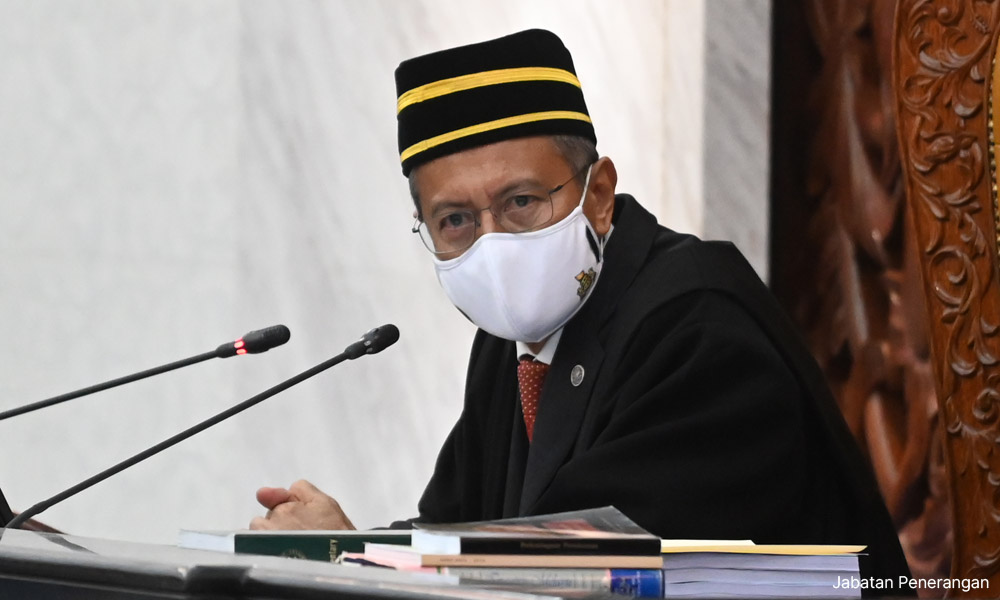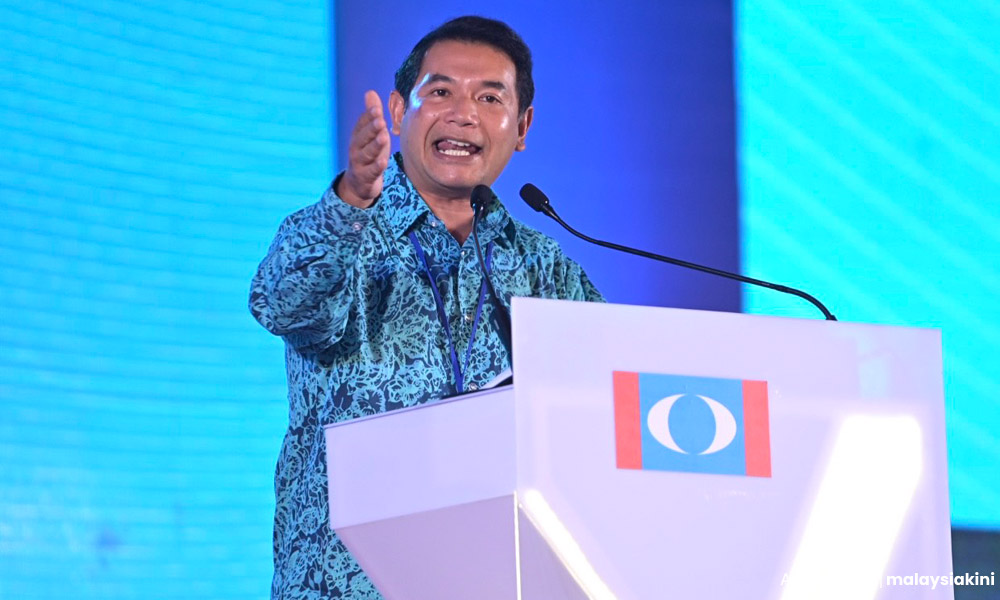Parliamentary speaker Azhar Azizan Harun has chided MPs who want to debate claims over Petronas assets by the purported heirs of the Sulu sultanate, as this could reveal the government’s legal strategies to the enemy.
“Do we want as we are debating this, I don’t know what will be said, the government’s strategy revealed, and there are criticisms of it?
“Then the other side can learn (our strategy). Would that not hurt the government’s interest in its litigation proceedings? Do we want to show our strategy to the world?
“The first rule of litigation is the element of surprise, the first rule of war is the same,” he said in Parliament on June 20.
Hence, the speaker said it was his responsibility to ensure that the government’s strategies were not exposed.
The purported heirs of the last Sulu sultan, Sultan Jamalul Kiram II, are using international legal processes in a bid to claim US$14.92 billion (RM66.38 billion) in overdue cession payments for Sabah.
The arbitration process was initiated in response to Malaysia cutting off the annual cession payments of RM5,300 to the Sulu sultanate in 2013.
Following the award, the Sulu side, via their lawyers, managed to seize two Luxembourg-incorporated subsidiaries of Petronas worth US$2 billion (RM8.9 billion).
Malaysia is challenging the Sulu claim in courts in Spain and France, which Azhar argues makes any debate on the matter run afoul of Parliament standing orders on sub judice.

Lie or wrongful action?
Former premier Najib Abdul Razak is being blamed for cutting off the annual cession payments in 2013, and in line with the call by newly minted PKR deputy president Rafizi Ramli that PKR members must lodge police reports every time Najib tells “lies”, over 100 PKR divisions had lodged police reports against Najib on July 19.
But where is the lie, and where is the truth when what Najib did was just cutting off the annual payments? It is indeed very strange for PKR to describe this action as constituting lies.
At most, it should be seen as just whether Najib’s action then was right or wrong. It has nothing to do with lies.
And why the need to overwhelm the police, whose main duty is to keep law and order, with over 100 reports of the same thing?
One would have thought that after some years of living in the political wilderness, Rafizi’s comeback to politics would add some dynamism to PKR and the nation’s political scene.
But sad to say, this will not be the case, as he can’t even tell the difference between a lie and an action that could be right or wrong.
And so, politics in Malaysia will be the same old, same old of scoring points in order to win power, and the same power-hungry politicians will again be at the forefront of politics for some years to come.

‘Saisie-arret’
As it is, things are favourable on the Malaysian side. Firstly, on July 12, Malaysia obtained a stay order against the enforcement of a French arbitration court ruling ordering the government to pay US$14.9 billion to the descendants of a late sultan over a colonial-era land deal.
The Paris Court of Appeal allowed an application by the Malaysian government for the stay after finding enforcement of the award could infringe the country’s sovereignty, Malaysia’s law minister Wan Junaidi Tuanku Jaafar said in a statement.
Secondly, Petronas has clarified through a statement although its two subsidiaries – Petronas Azerbaijan (Shah Deniz) Sàrl and Petronas South Caucasus Sàrl – had been served with ‘Saisie-arret’ on July 11, both subsidiaries have previously divested their entire assets in the Republic of Azerbaijan, and the proceeds from the exercise have been duly repatriated.
‘Saisie-arret’ is a French term which generally means an act of seizure based on the number of judgments or arbitral awards obtained.
Petronas views the actions taken against it as baseless and is working vigorously to defend its legal position on this matter.
Hence, while the final conclusion of this saga will be played out in the courtroom in Paris, for Malaysians, including MPs, it is enough for them to know the basic outline of the saga as provided by the government.
Revealing more through parliamentary debate will only hurt national interest, as the other party will duly listen and take appropriate actions.

Ambigious term
The genesis of the Sulu claims on Sabah was vested in historical fact when in 1878, the Sultan of Sulu decided to grant and cede what is now Sabah to a British company.
The bone of contention in the 1878 agreement is the Malay word “pajakkan” used in the agreement. While Spanish linguists in 1878 and American anthropologists H Otley Beyer and Harold Conklin in 1946 translated “pajakkan” as “arrendamiento” or “to lease”, the British used the interpretation of historian Najeeb Mitry Saleeby in 1908, and William George Maxwell and William Summer Gibson in 1924, which translated “pajakkan” as “to grant and cede”.
The 1878 agreement also stipulated that in return for this cessation of territory, the British company must pay an annual sum of 5,000 to the Sulu sultan. And subsequently, under the British rule of Sabah, it had always paid these cessation monies.
The tussle between Malaysia and the Philippines over Sabah had been a long-standing one. The Suluks wanted Sabah to be returned to them, claiming it was seized by the British from their government.
But Malaysia had always rejected the Philippines’ territorial claim to Sabah as it deemed Sabah residents had exercised their right to self-determination when they voted to join the Malaysian federation in 1963.
The Sulu sultanate also lost its rights in the Madrid protocol of 1885 when their predecessors, Spain, relinquished all their claims to Sabah, giving all control to Malaysia’s predecessors, the British.
However, it was subsequently learnt the Malaysian Embassy in the Philippines was issuing cheques for RM5,300 to the legal counsel of the heirs of the Sultan of Sulu in keeping with the terms of an 1887 agreement.
While Malaysia, and its predecessors, the British, considered it as an annual cession payment for the disputed state, the sultan’s descendants considered it as “rent”.
But all these ambiguities were settled when in 1903, Sultan Jamalul Kiram II, signed a document known as the “Confirmation of cession of certain islands”, under which he granted and ceded additional islands, in addition to the land agreed upon in 1878, in the vicinity of the mainland of North Borneo from Banggi Island to Sibuku Bay to the British North Borneo Company.
In the 1903 agreement, the ambiguous term “pajakkan” was no longer used. Instead, the phrase “kita telah keredai menyerahkan kepada pemerintah British North Borneo”, which literally means “we have willingly surrendered to the Government of British North Borneo”, was used in the agreement, asserting the understanding of the Sulu Sultanate of that time of the meaning of the earlier agreement in 1878.
The confirmatory deed of 1903 makes it known and understood between the two parties that the islands mentioned were included in the cession of the districts and islands mentioned in the 1878 agreement. The originally agreed 5,000 dollars increased to 5,300 dollars per year, payable annually since 1903.
Thus it is very important to understand the historical perspective of an international agreement, as one will only ignore history at one’s own peril. - Mkini
JAMARI MOHTAR is the editor of Let’s Talk!, an e-newsletter on current affairs.
The views expressed here are those of the author/contributor and do not necessarily represent the views of MMKtT.




No comments:
Post a Comment
Note: Only a member of this blog may post a comment.